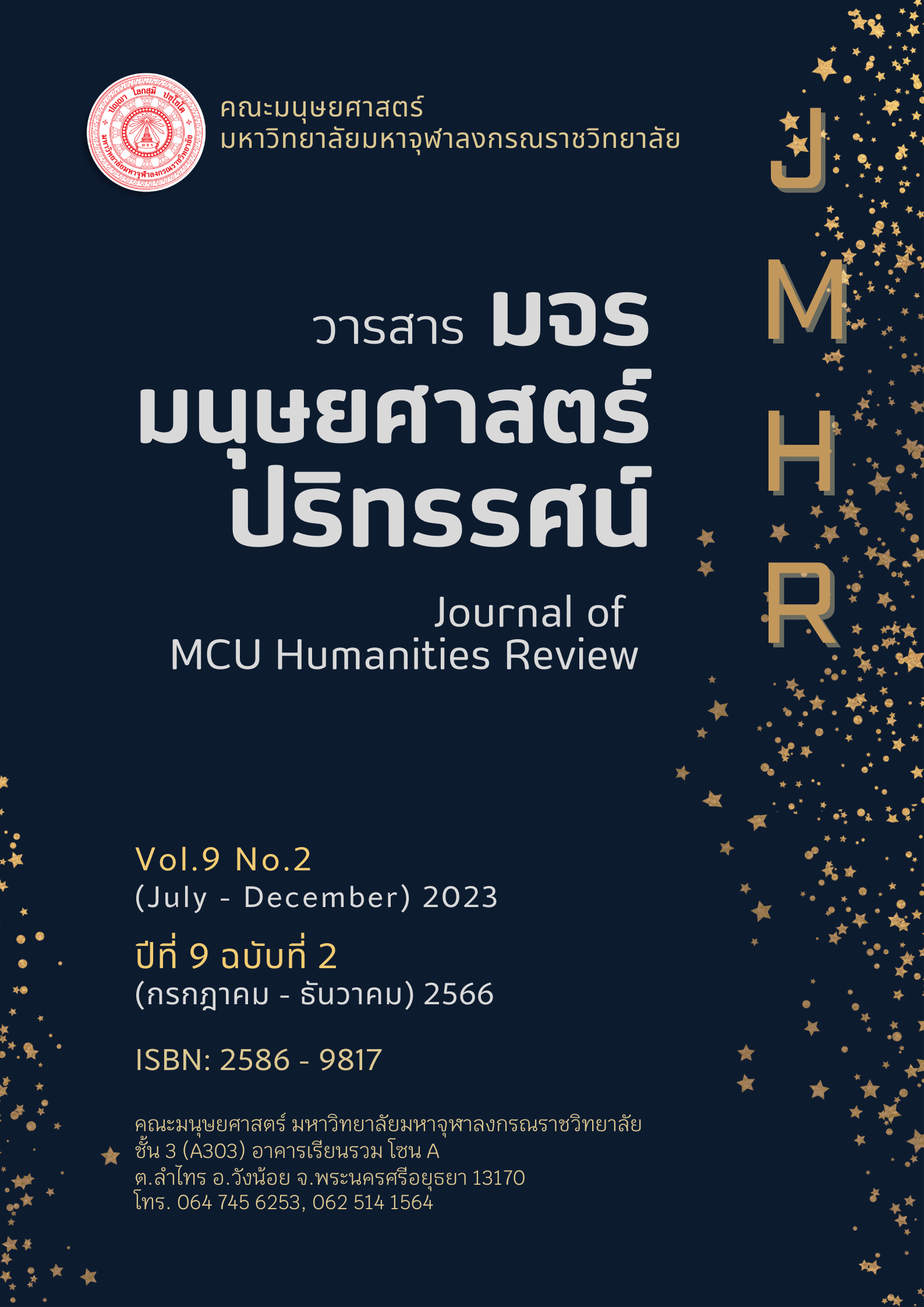การศึกษาความสัมพันธ์ระหว่างพฤติกรรมการอบรมดูแลของครอบครัวและพฤติกรรมด้านความกตัญญูตามแนวพุทธจิตวิทยาของนักเรียนประถมศึกษาตอนปลาย
คำสำคัญ:
ความสัมพันธ์, พฤติกรรมการดูแลในครอบครัว, ความกตัญุญู, นักเรียนบทคัดย่อ
การวิจัยนี้มีวัตถุประสงค์ 1. เพื่อศึกษาระดับพฤติกรรมการอบรมดูแลของครอบครัวและพฤติกรรมด้านความกตัญญูตามแนวพุทธจิตวิทยาของนักเรียนประถมศึกษาตอนปลาย 2. เพื่อศึกษาความสัมพันธ์ระหว่างพฤติกรรมการอบรมดูแลของครอบครัวและพฤติกรรมด้านความกตัญญูตามแนวพุทธจิตวิทยาของนักเรียนประถมศึกษาตอนปลาย การวิจัยนี้เป็นการวิจัยเชิงปริมาณ ใช้แบบสอบถามเป็นเครื่องมือในการเก็บรวบรวมข้อมูลจากกลุ่มตัวอย่าง จำนวน 222 คน วิเคราะห์ข้อมูลโดยใช้สถิติค่าร้อยละ ค่าเฉลี่ย ส่วนเบี่ยงเบนมาตรฐาน และทดสอบความสัมพันธ์โดยใช้ค่าสัมประสิทธิ์สหสัมพันธ์เพียร์สัน
ผลการวิจัยพบว่า
- ระดับพฤติกรรมการอบรมดูแลของครอบครัว โดยภาพรวมอยู่ในระดับปานกลาง (
=2.26, S.D. = 0.32) เมื่อจำแนกเป็นด้าน พบว่า ด้านการอบรมสั่งสอน อยู่ในระดับปานกลาง (
= 2.27, S.D. = 0.36) เป็นอับดับที่ 1 รองลงมา ได้แก่ ด้านสัมพันธภาพในครอบครัว อยู่ในระดับปานกลาง (
= 2.24, S.D. = 0.36) เป็นอันดับที่ 2 ตามลำดับ
ระดับพฤติกรรมด้านความกตัญญูตามแนวพุทธจิตวิทยาของนักเรียนประถมศึกษาตอนปลาย โดยภาพรวมอยู่ในระดับปานกลาง ( =2.17, S.D. = 0.30) เมื่อจำแนกเป็นรายด้าน พบว่า ด้านความกตัญญูต่อพ่อแม่และปกครอง อยู่ในระดับปานกลาง (
= 2.25, S.D. = 0.30) เป็นอับดับที่ 1 รองลงมา ได้แก่ ด้านความกตัญญูต่อบุคคล อยู่ในระดับปานกลาง (
= 2.19, S.D. = 0.34) เป็นอันดับที่ 2 ส่วนด้านความกตัญญูต่อสถาบัน อยู่ในระดับปานกลาง (
= 2.07, S.D. = 0.41) เป็นอันดับสุดท้าย ตามลำดับ
- ผลความสัมพันธ์ระหว่างพฤติกรรมการอบรมดูแลของครอบครัวและพฤติกรรมด้านความกตัญญูตามแนวพุทธจิตวิทยาของนักเรียนประถมศึกษาตอนปลาย โดยภาพรวม พบว่า มีค่าความสัมพันธ์ (r) เชิงบวกระดับค่อนข้างสูงอย่างมีนัยสำคัญทางสถิติที่ระดับ .01 โดยมีค่าสัมประสิทธิ์โดยรวมเท่ากับ .619 เมื่อจำแนกเป็นรายด้าน พบว่า ด้านความกตัญญูต่อบุคคล ด้านความกตัญญูต่อสถาบัน และด้านความกตัญญูต่อพ่อแม่และผู้ปกครอง มีความสัมพันธ์กันในเชิงบวก อยู่ในระดับปานกลาง (r = .530, .527 และ .515) ตามลำดับ
เอกสารอ้างอิง
คันธรส ภาผล. (2563). การวิเคราะห์การอบรมเลี้ยงดูเด็กปฐมวัยตามวิถีชีวิตไทยของผู้ปกครอง: กรณีศึกษาเขตพื้นที่ภาคกลาง. วารสารบัณฑิตศึกษา, 14(3), 27-40.
ณัฐทิญาภรณ์ การะเกตุ, (2020). การพัฒนาพฤติกรรมทางสังคมของเด็กปฐมวัยโดยใช้กิจกรรมศิลปะสร้างสรรค์. Journal of Modern Learning Development, 5(2), 40-54.
บุญญาภา แจงสี. (2544). การศึกษาเปรียบเทียบรูปแบบการอบรมเลี้ยงดูที่มีผลต่อความผูกพันใกล้ชิด การเห็นคุณค่าในตนเองและการยอมรับตนเองของนักศึกษาที่มีพฤติกรรมเสี่ยงและไมเสี่ยงของสถาบันเทคโนโลยีราชมงคล วิทยาเขตพระนครใต้ (วิทยานิพนธ์วิทยาศาสตรมหาบัณฑิต). มหาวิทยาลัยรามคำแหง. กรุงเทพฯ.
พรทิพย์ ช่วยเพล และ อภิษฎาข์ ศรีเครือดง. (2019) ความสัมพันธ์ของสมาชิกในครอบครัวกับสุขภาพจิตของวัยรุ่นไทย. วารสารศิลปะศาสตร์ราชมงคลสุวรรณภูมิ, 1(3), 207-220.
พระธรรมจร จนฺทธมฺโม (ศรีสุข). (2561). แนวทางการปลูกฝงความกตัญูกตเวทีสําหรับนักเรียนในโรงเรียนประถมศึกษา จังหวัดนนทบุรี (วิทยานิพนธ์พุทธศาสตร์มหาบัณฑิต). มหาวิทยาลัยมหาจุฬาลงกรณราชวิทยาลัย. พระนครศรีอยุธยา.
พระเมธีธรรมาภรณ์ (ประยูร ธมฺมจิตฺโต). (2538). ธรรมะและการอนุรักษ์สิ่งแวดล้อม. กรุงเทพฯ: โรงพิมพ์บริษัท สหธรรมิก จำกัด.
พระมหาศุภชัย สุโภภาโส. (2560). การศึกษาเชิงวิเคราะห์วิธีการปฏิบัติตนตามหลักกตัญญูกตเวทีในพุทธปรัชญาเถรวาทของคนไทย. วารสารพุทธศาสตร์ศึกษา, 8(1), 50-60.
พระมหาสุเทพ สุทฺธิญาโณ, ประยูร สุยะใจ และคณะ. (2560). ยุทธศาสตร์พฤติกรรมเชิงพุทธในการเสริมสร้างความสมดุลของชีวิตและครอบครัว (รายงานการวิจัย). มหาวิทยาลัยมหาจุฬาลงกรณราชวิทยาลัย. พระนครศรีอยุธยา.
เมธิรา ไกรนที และคณะ. (2563). ครอบครัว:สถาบันหลักทางสังคมกับบทบาทการพัฒนามนุษย์แบบองค์รวม. วารสารปาริชาติ มหาวิทยาลัยทักษิณ, 33(1), 1-16.
ศรีเพ็ญ สิงห์แก้ว. (2561). หลักพุทธธรรมเพื่อการส่งเสริมพัฒนาการบุตรของหน่วยสาธิตการสร้างเสริมสุขภาพเด็กเล็ก คณะพยาบาลศาสตร์ มหาวิทยาลัยเชียงใหม่. วารสารพุทธศาสตร์ศึกษา มจร, 9(1), 57-68.
สุชาดา พิชัยธรรม. (2562). ความสัมพันธ์ระหว่างปัจจัยครอบครัวและรูปแบบการอบรมเลี้ยงดูของผู้ปกครองกับภาวะโภชนาการของนักเรียนชั้นประถมศึกษาปีที่ 4 - 6 ของโรงเรียน สังกัดสำนักงานคณะกรรมการการศึกษาขั้นพื้นฐาน อำเภอเมือง จังหวัดพิษณุโลก (วิทยานิพนธ์หลักสูตรพยาบาลศาสตรมหาบัณฑิต). มหาวิทยาลัยนเรศวร. พิษณุโลก.
สุวรรณฐา ลึม และ พระปลัดสมชาย ปโยโค (ดำเนิน). (2562). แนวทางส่งเสริมกตัญญูกตเวทีในสังคมไทย. วารสารสันติศึกษาปริทรรศน์ มจร, 7(2), 425-434.
ดาวน์โหลด
เผยแพร่แล้ว
รูปแบบการอ้างอิง
ฉบับ
ประเภทบทความ
หมวดหมู่
สัญญาอนุญาต
ลิขสิทธิ์ (c) 2023 วารสาร มจร มนุษยศาสตร์ปริทรรศน์

อนุญาตภายใต้เงื่อนไข Creative Commons Attribution-NonCommercial-NoDerivatives 4.0 International License.






